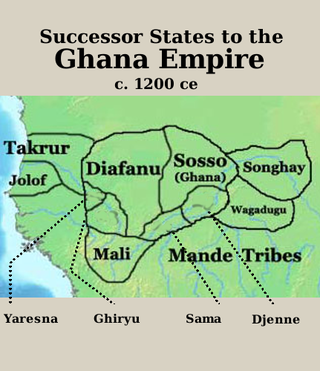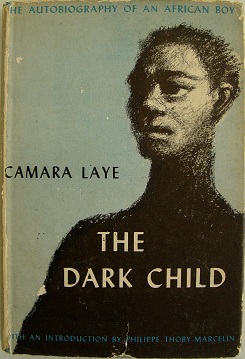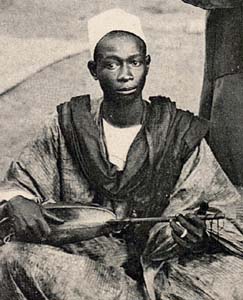Related Research Articles

The Mali Empire was an empire in West Africa from c. 1226 to 1670. The empire was founded by Sundiata Keita and became renowned for the wealth of its rulers, especially Mansa Musa. The Manding languages were spoken in the empire. At its peak, Mali was the largest empire in West Africa, widely influencing the culture of the region through the spread of its language, laws and customs. Much of the recorded information about the Mali Empire comes from 14th-century Tunisian historian Ibn Khaldun, 14th-century Moroccan traveller Ibn Battuta and 16th-century Andalusian traveller Leo Africanus. The other major source of information comes from Mandinka oral tradition, as recorded by storytellers known as griots.

The balafon is a gourd-resonated xylophone, a type of struck idiophone. It is closely associated with the neighbouring Mandé, Senoufo and Gur peoples of West Africa, particularly the Guinean branch of the Mandinka ethnic group, but is now found across West Africa from Guinea to Mali. Its common name, balafon, is likely a European coinage combining its Mandinka name ߓߟߊ bala with the word ߝߐ߲ fôn 'to speak' or the Greek root phono.

"Liberté" is the national anthem of Guinea. Adopted upon independence in 1958, it was arranged by Fodéba Keïta and is based on the melody of a Maninka praise song by Korofo Moussa for 19th-century Fouta Djallon king Alpha Yayo Diallo.

Guinea is a West African nation, composed of several ethnic groups. Among its most widely known musicians is Mory Kanté - 10 Cola Nuts saw major mainstream success in both Guinea and Mali while "Yeke Yeke", a single from Mory Kanté à Paris, was a European success in 1988.

A griot is a West African historian, storyteller, praise singer, poet, and/or musician.

The Mandinka or Malinke are a West African ethnic group primarily found in southern Mali, the Gambia and eastern Guinea. Numbering about 11 million, they are the largest subgroup of the Mandé peoples and one of the largest ethnic-linguistic groups in Africa. They speak the Manding languages in the Mande language family and a lingua franca in much of West Africa. Over 99% of Mandinka adhere to Islam. They are predominantly subsistence farmers and live in rural villages. Their largest urban center is Bamako, the capital of Mali.
Sundiata Keita was a prince and founder of the Mali Empire. He is also the great-uncle of the Malian ruler Mansa Musa, known for being the wealthiest person of all time.
The Mandé peoples are ethnic groups who are speakers of Mande languages. Various Mandé speaking ethnic groups are found particularly toward the west of West Africa. The Mandé Speaking languages are divided into two primary groups: East Mandé and West Mandé.

Soumaoro Kanté was a 13th-century king of the Sosso people. Seizing Koumbi Saleh, the capital of the recently defunct Ghana Empire, Soumaoro Kanté proceeded to conquer several neighboring states, including the Mandinka people in what is now Mali. However, the Mandinka prince Sundiata Keita built a coalition of smaller kingdoms to oppose him at the Battle of Kirina, defeating the Sosso and leaving Sundiata's new Mali Empire dominant in the region.
Sunjata [] is an epic poem of the Malinke people that tells the story of the hero Sundiata Keita, the founder of the Mali Empire. The epic is an instance of oral tradition, going back to the 13th century and narrated by generations of griot poets or jeliw (djeli). There is no single or authoritative version. Material pertaining to the epic first began to be collected during the early 20th century in French Sudan, notably by the French elite school École William Ponty, resulting in the "modern" version of the tale as considered standard today, as published in "novelistic" form in French translation by Djibril Tamsir Niane in 1960.
Bembeya Jazz National is a Guinean jazz group that gained fame in the 1960s for their Afropop rhythms. They are considered one of the most significant bands in Guinean music. Many of their recordings are based on traditional folk music in the country and have been fused with jazz and Afropop style. Featuring guitarist Sekou "Diamond Fingers" Diabaté, who grew up in a traditional griot musical family, the band won over fans in Conakry, Guinea's capital city, during the heady days of that country's newfound independence. Bembeya Jazz fell onto harder times in the 1980s and disbanded for a number of years, but reformed in the late 1990s and toured Europe and North America in the early 2000s.

Ken Bugul is the pen name of Senegalese Francophone novelist Mariètou Mbaye Biléoma. In the Wolof language, her pen name means "one who is unwanted".
Camara Laye was a writer from Guinea. He was the author of The African Child, a novel based loosely on his own childhood, and The Radiance of the King. Both novels are among the earliest major works in Francophone African literature. Camara Laye later worked for the government of newly independent Guinea, but went into voluntary exile over political issues.

The Yalunka, or Dialonké, are a Mandé-speaking people who were one of the original inhabitants of the Futa Jallon, a mountainous region in Guinea, West Africa. The Yalunka people live primarily in Guinea, particularly in Faranah, while smaller communities are found in Kouroussa. Additional Yalunka are also located in northeastern Sierra Leone, southeastern Senegal, and southwestern Mali.

Fodéba Keïta was a Guinean dancer, musician, writer, playwright, composer and politician. Founder of the first professional African theatrical troupe, Theatre Africain, he also arranged Liberté, the national anthem of Guinea.
Mamadou Sidiki Diabaté is a prominent Mandé kora player and jeli from Bamako, Mali. He is the 71st generation of kora players in his family and a son to Sidiki Diabaté.

The African Child is an autobiographical French novel by Camara Laye published in 1953. It tells the story of a young African child, Baba, growing up in Guinea. The novel won the Prix Charles Veillon writing prize.

The Nyamakala, or Nyamakalaw, are the historic occupational castes among Islamic societies of West Africa, particularly among the Mandinka people. The Nyamakala are known as Nyaxamalo among the Soninke people, and Nyenyo among the Wolof people. They are found throughout the Sahel region, from Mali and Senegal to Chad and several other parts of the West African region historically known as the "Western Sudan".

Manding, Manden or even Mandé is a region located in West Africa, a space between southern Mali and eastern Guinea. It is the historic home of the Mandingo community.
References
- 1 2 Esonwanne, Uzo (1993). "The Nation as Contested Referent". Research in African Literatures . 24 (4): 49–62. See p. 52 and p. 56.
- 1 2 Azodo, Ada Uzoamaka (1994). "The Work in Gold as Spiritual Journey in Camara Layé's The African Child". Journal of Religion in Africa . 24 (1): 52–61. JSTOR 1581374. See p. 52 and p. 59.
- 1 2 Miller, Christopher L. (1990). Theories of Africans: Francophone Literature and Anthropology in Africa. University of Chicago Press. pp. 57, 166–67. ISBN 9780226528021.
- ↑ Frindéthié, K. Martial (2014). Francophone African Cinema: History, Culture, Politics and Theory. McFarland. pp. 37–38. ISBN 9780786453566.
- ↑ Counsel, Graeme (2018). "Sound archives in West Africa". In Baker, Sarah; Strong, Catherine; Istvandity, Lauren; Cantillon, Zelmarie (eds.). The Routledge Companion to Popular Music History and Heritage. Routledge. p. 891 n. 5. ISBN 9781315299297.
- ↑ Posthumus, Bram (2016). Guinea: Masks, Music and Minerals. Oxford UP. p. 183. ISBN 9781787381162.
- ↑ Knowles, Mark (2002). Tap Roots: The Early History of Tap Dancing. McFarland. pp. 44, 103. ISBN 9780786412679.
- ↑ Cartwright, Keith (2014). Reading Africa into American Literature: Epics, Fables, and Gothic Tales. UP of Kentucky. p. 40. ISBN 9780813158334.